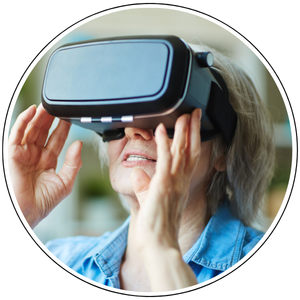A VIRTUAL WORLD OF POSSIBILITY
Lisa Sheehy, PhD sees VR as innovative and compassionate care
 How a patient or resident feels engaged makes all the difference in their care. Sometimes, that means fostering a connection and joy. Sometimes, that means needing a diversion, a chance to let the mind wander elsewhere.
How a patient or resident feels engaged makes all the difference in their care. Sometimes, that means fostering a connection and joy. Sometimes, that means needing a diversion, a chance to let the mind wander elsewhere.
Lisa Sheehy, PhD, Investigator with the Bruyère Health Research Institute and registered physiotherapist, sees virtual reality (VR) as an innovative way to provide compassionate care.
“Some of us could use a little distraction,” says Sheehy. “Virtual reality is an amazing technology for immersing people in a different world than their own.”
Sheehy has been working with non-immersive and immersive virtual reality tools for years. For her, VR is far more than an avenue for entertainment. It’s engagement and education for rehabilitation patients. It’s a companion for people living with dementia in long-term care. It’s a therapeutic escape for patients experiencing pain.
Virtual companions offer a friendly conversation
According to the World Health Organization’s estimates, one in four older adults experience social isolation. In Canada, almost 70% of residents living in long-term care are living with dementia, and unfortunately, their risk for depression and isolation is even higher.
She is part of a team that is developing and testing a virtual companion called ‘Kiera’ for residents living with cognitive impairment in long-term care, and the recent advances in artificial intelligence (AI) have changed the game for them.
Unlike most AI applications that are focused on answering queries, Kiera’s development is focused on engaging people living with dementia in a way that inspires rich and meaningful reminiscence and storytelling.
“It’s not a replacement for other people, but VR could help improve quality of life, reduce social isolation, and reduce responsive and reactive dementia behaviours for residents in long-term care,” says Sheehy. “Our studies are showing that many of the residents remain engaged in long, intimate and heart-warming conversations that help combat loneliness.”
Virtual worlds offer an immersive escape

Virtual reality can be a powerful form of distraction therapy. For patients who are experiencing the challenges that come with complex and chronic conditions, VR offers a healthy means of escape.
Sheehy also studies the impact of immersive VR experiences in complex care, and whether it can help people with pain management. Patients with chronic pain have used it in their rooms as a way to take a break from the hospital environment. Other patients have used it during wound dressing changes, to alleviate pain and distress.
Her initial results suggest that immersive VR experiences can reduce feelings of pain and discomfort, at least in the short term.
“VR and AI can be fun and games, but at Bruyère Health, they are tangible examples of the ways we can use technology to improve our patients’ and residents’ quality of life,” says Sheehy. “I see a chance to deliver a better care experience by giving people a chance to take a break not only from their surroundings, but their day-to-day struggles.”